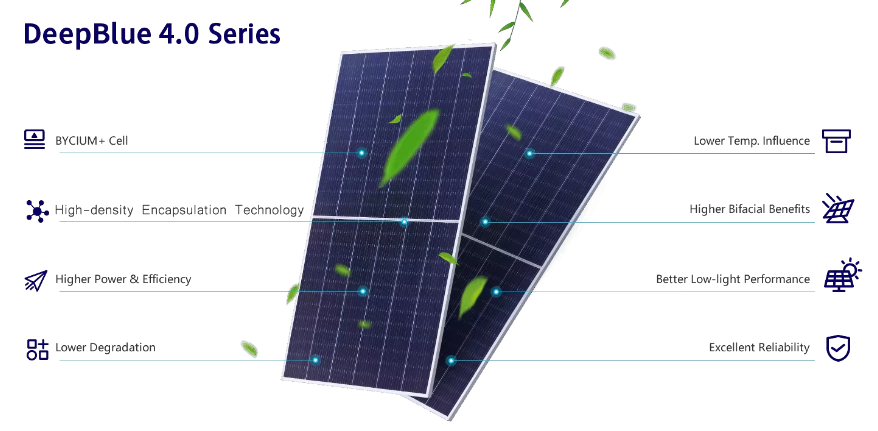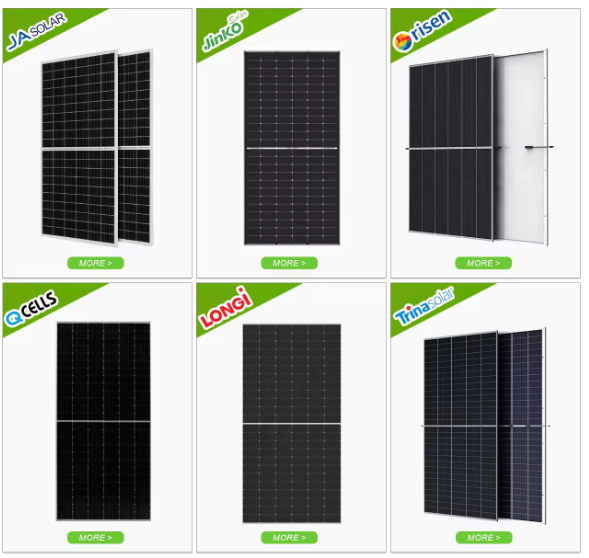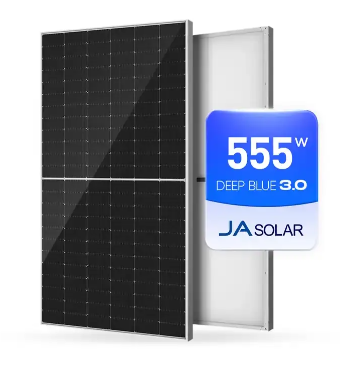
วิธีเลือกแผงโซล่าเซลล์ Tier 1 ให้เหมาะกับบ้าน: คู่มือฉบับสมบูรณ์
การติดตั้งแผงโซล่าเซลล์ในบ้านเป็นวิธีที่ดีในการลดค่าไฟฟ้าและช่วยรักษาสิ่งแวดล้อม แต่การเลือกแผงโซล่าเซลล์ที่เหมาะสมเป็นสิ่งสำคัญที่จะต้องพิจารณาเพื่อให้ได้รับประโยชน์สูงสุด บทความนี้จะให้คำแนะนำในการเลือกแผงโซล่าเซลล์ Tier 1 ที่เหมาะสมกับขนาดและความต้องการของบ้านคุณ
1. รู้จักกับแผงโซล่าเซลล์ Tier 1
- นิยามของแผงโซล่าเซลล์ Tier 1: แผงโซล่าเซลล์ที่ถูกจัดอันดับใน Tier 1 มักจะผลิตโดยบริษัทที่มีประสบการณ์และความน่าเชื่อถือสูงในวงการ มีประวัติการผลิตที่ดี และได้รับการยอมรับในตลาด
- ประโยชน์ของการเลือกแผงโซล่าเซลล์ Tier 1: แผงที่มีคุณภาพสูง, ประสิทธิภาพดี, และการรับประกันที่น่าเชื่อถือ

2. การประเมินความต้องการพลังงานของบ้าน
- การคำนวณการใช้ไฟฟ้ารายวัน: ใช้บิลค่าไฟฟ้าเพื่อดูการใช้ไฟฟ้ารายเดือนและคำนวณค่าเฉลี่ยการใช้ไฟฟ้าต่อวัน
- การเลือกขนาดระบบโซล่าเซลล์: เลือกระบบที่สามารถผลิตพลังงานได้เพียงพอต่อการใช้งานในแต่ละวัน
3. การประเมินพื้นที่ติดตั้งแผงโซล่าเซลล์
- การวัดพื้นที่บนหลังคา: วัดพื้นที่ที่สามารถติดตั้งแผงโซล่าเซลล์ได้
- การพิจารณาแสงแดด: ตรวจสอบการได้รับแสงแดดของพื้นที่ติดตั้งแผงโซล่าเซลล์
4. การพิจารณาประสิทธิภาพของแผงโซล่าเซลล์
- ค่าประสิทธิภาพของแผง: เปรียบเทียบค่าประสิทธิภาพของแผงโซล่าเซลล์ที่แตกต่างกัน
- ความทนทานและการรับประกัน: ตรวจสอบความทนทานของแผงและการรับประกันที่ได้รับ
5. การเปรียบเทียบแบรนด์ต่าง ๆ
- การวิจัยแบรนด์: ศึกษาแบรนด์ที่เป็นที่นิยมในตลาดและมีรีวิวดี
- การเปรียบเทียบคุณสมบัติ: เปรียบเทียบคุณสมบัติและราคาของแผงโซล่าเซลล์จากแบรนด์ต่าง ๆ


6. การตรวจสอบการรับประกันและบริการหลังการขาย
- การรับประกันสินค้า: ตรวจสอบระยะเวลาและเงื่อนไขการรับประกันของแผงโซล่าเซลล์
- บริการหลังการขาย: ตรวจสอบว่าบริษัทมีบริการหลังการขายที่ดีหรือไม่
7. การคำนึงถึงงบประมาณ
- การตั้งงบประมาณ: กำหนดงบประมาณในการติดตั้งแผงโซล่าเซลล์
- การเลือกสินค้าที่เหมาะสมกับงบประมาณ: เลือกแผงโซล่าเซลล์ที่มีคุณภาพและราคาอยู่ในงบประมาณ
8. การติดตั้งและการบำรุงรักษา
- การเลือกบริษัทติดตั้ง: เลือกบริษัทติดตั้งที่มีประสบการณ์และความเชี่ยวชาญ
- การบำรุงรักษาแผงโซล่าเซลล์: การดูแลและบำรุงรักษาแผงโซล่าเซลล์เพื่อให้มีประสิทธิภาพสูงสุด
9. การวางแผนการใช้งานพลังงานแสงอาทิตย์
- การวางแผนระยะยาว: วางแผนการใช้งานพลังงานแสงอาทิตย์ในระยะยาว
- การประเมินผล: ตรวจสอบผลการใช้งานแผงโซล่าเซลล์อย่างสม่ำเสมอ
สรุป
การเลือกแผงโซล่าเซลล์ Tier 1 ที่เหมาะสมสำหรับบ้านของคุณนั้นมีหลายปัจจัยที่ต้องพิจารณา ตั้งแต่ความต้องการพลังงาน, พื้นที่ติดตั้ง, ประสิทธิภาพของแผง, แบรนด์, การรับประกัน, งบประมาณ, การติดตั้งและการบำรุงรักษา การวางแผนและการศึกษาอย่างละเอียดจะช่วยให้คุณได้แผงโซล่าเซลล์ที่เหมาะสมและมีประสิทธิภาพสูงสุด
FAQs
- แผงโซล่าเซลล์ Tier 1 คืออะไร?
- แผงโซล่าเซลล์ Tier 1 คือแผงที่ผลิตโดยบริษัทที่มีประสบการณ์และความน่าเชื่อถือสูงในวงการโซล่าเซลล์
- การคำนวณการใช้ไฟฟ้ารายวันทำอย่างไร?
- ใช้บิลค่าไฟฟ้าเพื่อดูการใช้ไฟฟ้ารายเดือนและคำนวณค่าเฉลี่ยการใช้ไฟฟ้าต่อวัน
- ทำไมต้องเลือกแผงโซล่าเซลล์ Tier 1?
- แผง Tier 1 มีคุณภาพสูง, ประสิทธิภาพดี, และการรับประกันที่น่าเชื่อถือ
- การบำรุงรักษาแผงโซล่าเซลล์ทำอย่างไร?
- การทำความสะอาดแผงอย่างสม่ำเสมอและการตรวจสอบการทำงานของแผงเป็นสิ่งสำคัญ
- แผงโซล่าเซลล์มีอายุการใช้งานเท่าไร?
- แผงโซล่าเซลล์มักมีอายุการใช้งานประมาณ 25-30 ปี

1. รู้จักกับแผงโซล่าเซลล์ Tier 1
นิยามของแผงโซล่าเซลล์ Tier 1
แผงโซล่าเซลล์ที่ถูกจัดอันดับใน Tier 1 มักจะผลิตโดยบริษัทที่มีประสบการณ์และความน่าเชื่อถือสูงในวงการ มีประวัติการผลิตที่ดี และได้รับการยอมรับในตลาด บริษัทเหล่านี้มีการลงทุนในงานวิจัยและพัฒนา (R&D) อย่างต่อเนื่อง และมีการผลิตที่มีมาตรฐานสูง แผงโซล่าเซลล์ Tier 1 มักได้รับการรับรองจากสถาบันหรือองค์กรต่าง ๆ ที่เกี่ยวข้อง ทำให้มั่นใจได้ในคุณภาพและประสิทธิภาพของสินค้า
ประโยชน์ของการเลือกแผงโซล่าเซลล์ Tier 1
- คุณภาพสูง: แผงโซล่าเซลล์ Tier 1 ผลิตจากวัสดุคุณภาพสูงและผ่านกระบวนการผลิตที่เข้มงวด ทำให้มีความทนทานและอายุการใช้งานยาวนาน
- ประสิทธิภาพดี: แผงโซล่าเซลล์ Tier 1 มักมีประสิทธิภาพการผลิตพลังงานสูง ทำให้คุณได้รับพลังงานมากขึ้นต่อพื้นที่ติดตั้ง
- การรับประกันที่น่าเชื่อถือ: บริษัทผู้ผลิตแผง Tier 1 มักมีการรับประกันที่ดีและบริการหลังการขายที่น่าเชื่อถือ ทำให้คุณมั่นใจได้ว่าแผงโซล่าเซลล์ของคุณจะทำงานได้ดีในระยะยาว
2. การประเมินความต้องการพลังงานของบ้าน
การคำนวณการใช้ไฟฟ้ารายวัน
- รวบรวมบิลค่าไฟฟ้ารายเดือน: เริ่มต้นด้วยการรวบรวมบิลค่าไฟฟ้าของบ้านในช่วง 6-12 เดือนที่ผ่านมา เพื่อให้เห็นภาพรวมของการใช้ไฟฟ้าในบ้านในแต่ละเดือน
- คำนวณการใช้ไฟฟ้ารายเดือนเฉลี่ย: นำจำนวนหน่วยไฟฟ้าจากบิลค่าไฟฟ้าในแต่ละเดือนมารวมกัน แล้วหารด้วยจำนวนเดือนที่คุณมีข้อมูล เช่น หากคุณมีบิล 12 เดือน ให้รวมหน่วยไฟฟ้าทั้งหมดแล้วหารด้วย 12
- แปลงเป็นการใช้ไฟฟ้ารายวัน: นำค่าเฉลี่ยการใช้ไฟฟ้ารายเดือนมาหารด้วยจำนวนวันในเดือน (30 หรือ 31 วัน) เพื่อหาค่าเฉลี่ยการใช้ไฟฟ้ารายวัน ตัวอย่างเช่น หากค่าเฉลี่ยการใช้ไฟฟ้ารายเดือนคือ 900 หน่วย การใช้ไฟฟ้ารายวันจะเท่ากับ 900/30 = 30 หน่วยต่อวัน
การเลือกขนาดระบบโซล่าเซลล์
- คำนวณพลังงานที่ต้องการผลิตต่อวัน: จากการใช้ไฟฟ้ารายวัน คำนวณขนาดของระบบโซล่าเซลล์ที่สามารถผลิตพลังงานได้เพียงพอต่อความต้องการ โดยพิจารณาจากประสิทธิภาพของแผงโซล่าเซลล์และจำนวนชั่วโมงที่แสงแดดสามารถใช้ได้ในแต่ละวัน
- เลือกขนาดแผงโซล่าเซลล์: พิจารณาจากจำนวนแผงโซล่าเซลล์ที่ต้องใช้เพื่อให้ได้พลังงานที่ต้องการ รวมถึงพื้นที่ติดตั้งที่มีอยู่ ตัวอย่างเช่น หากแผงโซล่าเซลล์แต่ละแผงสามารถผลิตพลังงานได้ 300 วัตต์ และคุณต้องการผลิตพลังงาน 30 หน่วยต่อวัน (30,000 วัตต์ชั่วโมง) คุณจะต้องใช้แผงโซล่าเซลล์ 100 แผง (30,000 / 300 = 100)
- คำนึงถึงปัจจัยภายนอก: นอกจากขนาดของแผงและจำนวนชั่วโมงที่แสงแดดสามารถใช้ได้ ยังต้องพิจารณาปัจจัยอื่น ๆ ที่อาจมีผลต่อการผลิตพลังงาน เช่น สภาพอากาศ, มุมและทิศทางของหลังคา, และการบังแสงจากสิ่งกีดขวางต่าง ๆ
การคำนวณและการเลือกขนาดระบบโซล่าเซลล์ที่เหมาะสมจะช่วยให้บ้านของคุณสามารถผลิตพลังงานได้เพียงพอต่อความต้องการ ช่วยลดค่าไฟฟ้าและเพิ่มประสิทธิภาพการใช้พลังงานอย่างยั่งยืน
3. การประเมินพื้นที่ติดตั้งแผงโซล่าเซลล์
การวัดพื้นที่บนหลังคา
- การวัดพื้นที่ที่มีอยู่: เริ่มต้นด้วยการวัดพื้นที่บนหลังคาที่สามารถติดตั้งแผงโซล่าเซลล์ได้ โดยคำนึงถึงพื้นที่ที่ไม่ได้ถูกบังด้วยสิ่งกีดขวาง เช่น ปล่องไฟ, ช่องระบายอากาศ, หรืออุปกรณ์อื่น ๆ ที่ติดตั้งบนหลังคา
- การคำนวณพื้นที่ใช้งาน: หลังจากวัดพื้นที่ทั้งหมดแล้ว นำข้อมูลที่ได้มาคำนวณพื้นที่ที่สามารถติดตั้งแผงโซล่าเซลล์ได้จริง โดยหักลบพื้นที่ที่ไม่สามารถใช้งานได้ออก
- การประเมินความแข็งแรงของหลังคา: ตรวจสอบว่าหลังคามีความแข็งแรงเพียงพอที่จะรองรับน้ำหนักของแผงโซล่าเซลล์และโครงสร้างการติดตั้งหรือไม่ หากจำเป็นควรปรึกษาผู้เชี่ยวชาญหรือวิศวกรเพื่อให้มั่นใจว่าหลังคาสามารถรองรับน้ำหนักได้
การพิจารณาแสงแดด
- การตรวจสอบทิศทางของหลังคา: ทิศทางของหลังคามีผลต่อการรับแสงแดด หลังคาที่หันไปทางทิศใต้จะได้รับแสงแดดมากที่สุดตลอดทั้งวัน ซึ่งเป็นทิศทางที่เหมาะสมที่สุดสำหรับการติดตั้งแผงโซล่าเซลล์
- การตรวจสอบมุมเอียงของหลังคา: มุมเอียงของหลังคามีผลต่อประสิทธิภาพการรับแสงแดด มุมเอียงที่เหมาะสมสำหรับแผงโซล่าเซลล์อยู่ระหว่าง 15-40 องศา ซึ่งจะช่วยให้แผงโซล่าเซลล์ได้รับแสงแดดมากที่สุดตลอดทั้งวัน
- การตรวจสอบการบังแสง: ตรวจสอบว่ามีสิ่งกีดขวางที่อาจบังแสงแดดบนแผงโซล่าเซลล์หรือไม่ เช่น ต้นไม้สูง, อาคารข้างเคียง, หรือปล่องไฟ การตรวจสอบนี้สามารถทำได้ในช่วงเวลาต่าง ๆ ของวันเพื่อให้แน่ใจว่าแผงโซล่าเซลล์จะได้รับแสงแดดอย่างเต็มที่ตลอดทั้งวัน
การประเมินพื้นที่ติดตั้งแผงโซล่าเซลล์อย่างละเอียดและรอบคอบจะช่วยให้คุณสามารถวางแผนการติดตั้งได้อย่างมีประสิทธิภาพ ทำให้แผงโซล่าเซลล์สามารถผลิตพลังงานได้มากที่สุดและเพิ่มความคุ้มค่าในการลงทุน
4. การพิจารณาประสิทธิภาพของแผงโซล่าเซลล์
ค่าประสิทธิภาพของแผง
-
ประสิทธิภาพการผลิตพลังงาน: ค่าประสิทธิภาพของแผงโซล่าเซลล์คือความสามารถในการแปลงพลังงานแสงอาทิตย์ให้เป็นพลังงานไฟฟ้า โดยปกติจะวัดเป็นเปอร์เซ็นต์ (Efficiency Rate) ค่าเปอร์เซ็นต์ที่สูงกว่าหมายถึงแผงสามารถผลิตพลังงานได้มากกว่าในพื้นที่ที่เท่ากัน
- การเปรียบเทียบประสิทธิภาพ: ตรวจสอบค่าประสิทธิภาพจากแผงโซล่าเซลล์จากผู้ผลิตต่าง ๆ เพื่อหาแผงที่มีประสิทธิภาพสูงที่สุด
- การทดสอบประสิทธิภาพ: ศึกษาข้อมูลจากการทดสอบที่ทำโดยองค์กรอิสระหรือหน่วยงานที่เชื่อถือได้ เช่น การทดสอบโดยสถาบันมาตรฐานแห่งชาติ หรือหน่วยงานตรวจสอบพลังงานแสงอาทิตย์
-
ประสิทธิภาพในสภาพแวดล้อมต่าง ๆ: ค่าประสิทธิภาพของแผงโซล่าเซลล์อาจแตกต่างกันในสภาพแวดล้อมที่ต่างกัน เช่น อุณหภูมิสูง, อุณหภูมิต่ำ, หรือในพื้นที่ที่มีแสงแดดน้อย
- การทดสอบในสภาพแวดล้อมต่าง ๆ: ตรวจสอบว่าแผงโซล่าเซลล์มีการทดสอบในสภาพแวดล้อมที่คล้ายคลึงกับพื้นที่ติดตั้งของคุณหรือไม่ เพื่อให้มั่นใจว่าแผงจะสามารถทำงานได้ดีในสภาพแวดล้อมของคุณ
- การรีวิวและความคิดเห็น: อ่านรีวิวและความคิดเห็นจากผู้ใช้งานในสภาพแวดล้อมที่คล้ายคลึงกับพื้นที่ติดตั้งของคุณ เพื่อดูว่าแผงโซล่าเซลล์ทำงานได้ดีเพียงใดในสภาพแวดล้อมนั้น
ความทนทานและการรับประกัน
-
วัสดุที่ใช้ในการผลิต: แผงโซล่าเซลล์ที่ผลิตจากวัสดุคุณภาพสูงมักจะมีความทนทานและอายุการใช้งานยาวนานกว่า วัสดุที่ใช้ในการผลิตแผงควรมีความทนทานต่อสภาพอากาศต่าง ๆ เช่น ฝน, ลม, หิมะ, และแสงแดดที่รุนแรง
- การตรวจสอบวัสดุ: ศึกษาข้อมูลเกี่ยวกับวัสดุที่ใช้ในการผลิตแผงโซล่าเซลล์ เช่น ชนิดของเซลล์แสงอาทิตย์ (Monocrystalline, Polycrystalline, Thin-Film), วัสดุโครงสร้าง, และวัสดุเคลือบผิว
- การทดสอบความทนทาน: ตรวจสอบว่าผู้ผลิตได้ทำการทดสอบความทนทานของแผงโซล่าเซลล์ในสภาพแวดล้อมที่หลากหลายหรือไม่
-
การรับประกันสินค้า: การรับประกันเป็นสิ่งสำคัญที่ช่วยเพิ่มความมั่นใจในการลงทุนในแผงโซล่าเซลล์ การรับประกันที่นานและครอบคลุมแสดงถึงความมั่นใจของผู้ผลิตในคุณภาพของสินค้า
- ระยะเวลาการรับประกัน: ตรวจสอบระยะเวลาการรับประกันของแผงโซล่าเซลล์ บางบริษัทอาจให้การรับประกันที่นานถึง 25 ปี ซึ่งแสดงถึงความมั่นใจในคุณภาพของสินค้า
- เงื่อนไขการรับประกัน: ตรวจสอบเงื่อนไขการรับประกัน เช่น การรับประกันประสิทธิภาพ (Performance Warranty) ที่รับประกันว่าแผงจะยังคงมีประสิทธิภาพในการผลิตพลังงานในระดับที่กำหนดภายในระยะเวลาที่รับประกัน
การพิจารณาประสิทธิภาพของแผงโซล่าเซลล์อย่างละเอียดจะช่วยให้คุณสามารถเลือกแผงที่มีคุณภาพสูงและมีประสิทธิภาพดี ทำให้การลงทุนในแผงโซล่าเซลล์ของคุณมีความคุ้มค่าสูงสุด
4. การพิจารณาประสิทธิภาพของแผงโซล่าเซลล์
ค่าประสิทธิภาพของแผง
-
ประสิทธิภาพการผลิตพลังงาน: ค่าประสิทธิภาพของแผงโซล่าเซลล์คือความสามารถในการแปลงพลังงานแสงอาทิตย์ให้เป็นพลังงานไฟฟ้า โดยปกติจะวัดเป็นเปอร์เซ็นต์ (Efficiency Rate) ค่าเปอร์เซ็นต์ที่สูงกว่าหมายถึงแผงสามารถผลิตพลังงานได้มากกว่าในพื้นที่ที่เท่ากัน
- การเปรียบเทียบประสิทธิภาพ: ตรวจสอบค่าประสิทธิภาพจากแผงโซล่าเซลล์จากผู้ผลิตต่าง ๆ เพื่อหาแผงที่มีประสิทธิภาพสูงที่สุด
- การทดสอบประสิทธิภาพ: ศึกษาข้อมูลจากการทดสอบที่ทำโดยองค์กรอิสระหรือหน่วยงานที่เชื่อถือได้ เช่น การทดสอบโดยสถาบันมาตรฐานแห่งชาติ หรือหน่วยงานตรวจสอบพลังงานแสงอาทิตย์
-
ประสิทธิภาพในสภาพแวดล้อมต่าง ๆ: ค่าประสิทธิภาพของแผงโซล่าเซลล์อาจแตกต่างกันในสภาพแวดล้อมที่ต่างกัน เช่น อุณหภูมิสูง, อุณหภูมิต่ำ, หรือในพื้นที่ที่มีแสงแดดน้อย
- การทดสอบในสภาพแวดล้อมต่าง ๆ: ตรวจสอบว่าแผงโซล่าเซลล์มีการทดสอบในสภาพแวดล้อมที่คล้ายคลึงกับพื้นที่ติดตั้งของคุณหรือไม่ เพื่อให้มั่นใจว่าแผงจะสามารถทำงานได้ดีในสภาพแวดล้อมของคุณ
- การรีวิวและความคิดเห็น: อ่านรีวิวและความคิดเห็นจากผู้ใช้งานในสภาพแวดล้อมที่คล้ายคลึงกับพื้นที่ติดตั้งของคุณ เพื่อดูว่าแผงโซล่าเซลล์ทำงานได้ดีเพียงใดในสภาพแวดล้อมนั้น
ความทนทานและการรับประกัน
-
วัสดุที่ใช้ในการผลิต: แผงโซล่าเซลล์ที่ผลิตจากวัสดุคุณภาพสูงมักจะมีความทนทานและอายุการใช้งานยาวนานกว่า วัสดุที่ใช้ในการผลิตแผงควรมีความทนทานต่อสภาพอากาศต่าง ๆ เช่น ฝน, ลม, หิมะ, และแสงแดดที่รุนแรง
- การตรวจสอบวัสดุ: ศึกษาข้อมูลเกี่ยวกับวัสดุที่ใช้ในการผลิตแผงโซล่าเซลล์ เช่น ชนิดของเซลล์แสงอาทิตย์ (Monocrystalline, Polycrystalline, Thin-Film), วัสดุโครงสร้าง, และวัสดุเคลือบผิว
- การทดสอบความทนทาน: ตรวจสอบว่าผู้ผลิตได้ทำการทดสอบความทนทานของแผงโซล่าเซลล์ในสภาพแวดล้อมที่หลากหลายหรือไม่
-
การรับประกันสินค้า: การรับประกันเป็นสิ่งสำคัญที่ช่วยเพิ่มความมั่นใจในการลงทุนในแผงโซล่าเซลล์ การรับประกันที่นานและครอบคลุมแสดงถึงความมั่นใจของผู้ผลิตในคุณภาพของสินค้า
- ระยะเวลาการรับประกัน: ตรวจสอบระยะเวลาการรับประกันของแผงโซล่าเซลล์ บางบริษัทอาจให้การรับประกันที่นานถึง 25 ปี ซึ่งแสดงถึงความมั่นใจในคุณภาพของสินค้า
- เงื่อนไขการรับประกัน: ตรวจสอบเงื่อนไขการรับประกัน เช่น การรับประกันประสิทธิภาพ (Performance Warranty) ที่รับประกันว่าแผงจะยังคงมีประสิทธิภาพในการผลิตพลังงานในระดับที่กำหนดภายในระยะเวลาที่รับประกัน
การพิจารณาประสิทธิภาพของแผงโซล่าเซลล์อย่างละเอียดจะช่วยให้คุณสามารถเลือกแผงที่มีคุณภาพสูงและมีประสิทธิภาพดี ทำให้การลงทุนในแผงโซล่าเซลล์ของคุณมีความคุ้มค่าสูงสุด





5. การเปรียบเทียบแบรนด์ต่าง ๆ
การวิจัยแบรนด์
-
ศึกษาความนิยมของแบรนด์ในตลาด: เริ่มต้นด้วยการวิจัยแบรนด์แผงโซล่าเซลล์ที่เป็นที่นิยมในตลาด ค้นหาข้อมูลเกี่ยวกับบริษัทผู้ผลิตและประวัติการทำงานของพวกเขา ดูว่าแบรนด์ใดที่ได้รับความไว้วางใจจากผู้ใช้และมีส่วนแบ่งตลาดสูง
- อ่านรีวิวและคำแนะนำ: ค้นหารีวิวและคำแนะนำจากผู้ใช้จริงที่เคยติดตั้งและใช้งานแผงโซล่าเซลล์จากแบรนด์ต่าง ๆ รีวิวจากผู้ใช้งานจริงจะช่วยให้คุณทราบถึงประสบการณ์และปัญหาที่อาจเกิดขึ้นในการใช้งาน
- ดูการจัดอันดับและรางวัล: ตรวจสอบการจัดอันดับและรางวัลที่แบรนด์ได้รับจากองค์กรหรือสถาบันที่เชื่อถือได้ การได้รับรางวัลหรือการจัดอันดับสูงมักเป็นสัญญาณที่ดีว่าแบรนด์มีคุณภาพและความน่าเชื่อถือ
-
ศึกษาการบริการหลังการขาย: การบริการหลังการขายเป็นสิ่งสำคัญที่ควรพิจารณาเมื่อเลือกแบรนด์ ศึกษาว่าแบรนด์มีบริการหลังการขายที่ดีเพียงใด เช่น การติดตั้ง, การซ่อมบำรุง, และการให้คำปรึกษาหลังการขาย
การเปรียบเทียบคุณสมบัติ
-
ประสิทธิภาพการผลิตพลังงาน: เปรียบเทียบค่าประสิทธิภาพการผลิตพลังงานของแผงโซล่าเซลล์จากแบรนด์ต่าง ๆ ค่าประสิทธิภาพที่สูงกว่าหมายถึงแผงสามารถผลิตพลังงานได้มากกว่าในพื้นที่ที่เท่ากัน
- การทดสอบประสิทธิภาพ: ตรวจสอบผลการทดสอบประสิทธิภาพจากองค์กรอิสระหรือหน่วยงานที่เชื่อถือได้ เพื่อให้มั่นใจว่าแผงโซล่าเซลล์จากแบรนด์นั้นมีประสิทธิภาพที่แท้จริง
-
ความทนทานและอายุการใช้งาน: เปรียบเทียบความทนทานและอายุการใช้งานของแผงโซล่าเซลล์จากแบรนด์ต่าง ๆ ศึกษาวัสดุที่ใช้ในการผลิตและการทดสอบความทนทานในสภาพแวดล้อมต่าง ๆ
- วัสดุและการผลิต: ศึกษาวัสดุที่ใช้ในการผลิตแผงโซล่าเซลล์ เช่น ชนิดของเซลล์แสงอาทิตย์ (Monocrystalline, Polycrystalline, Thin-Film) และวัสดุโครงสร้าง
- การทดสอบความทนทาน: ตรวจสอบว่าผู้ผลิตได้ทำการทดสอบความทนทานของแผงโซล่าเซลล์ในสภาพแวดล้อมที่หลากหลายหรือไม่
-
การรับประกันสินค้า: การรับประกันเป็นสิ่งสำคัญที่ช่วยเพิ่มความมั่นใจในการลงทุนในแผงโซล่าเซลล์ เปรียบเทียบระยะเวลาและเงื่อนไขการรับประกันจากแบรนด์ต่าง ๆ
- ระยะเวลาการรับประกัน: ตรวจสอบระยะเวลาการรับประกันของแผงโซล่าเซลล์ บางบริษัทอาจให้การรับประกันที่นานถึง 25 ปี
- เงื่อนไขการรับประกัน: ตรวจสอบเงื่อนไขการรับประกัน เช่น การรับประกันประสิทธิภาพ (Performance Warranty) และการรับประกันความทนทาน (Product Warranty)
-
ราคา: เปรียบเทียบราคาของแผงโซล่าเซลล์จากแบรนด์ต่าง ๆ โดยคำนึงถึงความคุ้มค่าในแง่ของประสิทธิภาพ, ความทนทาน, และการรับประกัน
- ราคาต่อวัตต์: คำนวณราคาต่อวัตต์ของแผงโซล่าเซลล์ เพื่อให้สามารถเปรียบเทียบราคาได้ง่ายขึ้น
- ความคุ้มค่า: พิจารณาความคุ้มค่าของแผงโซล่าเซลล์ในแง่ของประสิทธิภาพและความทนทาน โดยไม่ควรเลือกแผงที่มีราคาถูกแต่มีคุณภาพต่ำ
การวิจัยและเปรียบเทียบแบรนด์ต่าง ๆ อย่างละเอียดจะช่วยให้คุณสามารถเลือกแผงโซล่าเซลล์ที่เหมาะสมที่สุดสำหรับบ้านของคุณ ทั้งในด้านคุณภาพ, ประสิทธิภาพ, ความทนทาน, และความคุ้มค่าในการลงทุน

6. การเปรียบเทียบแบรนด์ต่าง ๆ โดยบริษัท ซันเนอร์ยี่
การวิจัยแบรนด์
-
ศึกษาความนิยมของแบรนด์ในตลาด: บริษัท ซันเนอร์ยี่ เริ่มต้นด้วยการศึกษาความนิยมของแบรนด์แผงโซล่าเซลล์ในตลาดปัจจุบัน โดยพิจารณาจากส่วนแบ่งการตลาด, ชื่อเสียง, และประวัติการผลิตของบริษัทผู้ผลิตแผงโซล่าเซลล์
- อ่านรีวิวและคำแนะนำ: บริษัท ซันเนอร์ยี่ ตรวจสอบรีวิวและคำแนะนำจากผู้ใช้งานจริงที่ติดตั้งและใช้งานแผงโซล่าเซลล์จากแบรนด์ต่าง ๆ รีวิวจากผู้ใช้งานจริงช่วยให้เห็นภาพรวมของคุณภาพและความน่าเชื่อถือของแบรนด์
- ดูการจัดอันดับและรางวัล: บริษัท ซันเนอร์ยี่ ค้นหาข้อมูลการจัดอันดับและรางวัลที่แบรนด์ได้รับจากองค์กรหรือสถาบันที่เชื่อถือได้ การได้รับรางวัลหรือการจัดอันดับสูงเป็นสัญญาณที่ดีว่าแบรนด์มีคุณภาพและความน่าเชื่อถือ
-
ศึกษาการบริการหลังการขาย: การบริการหลังการขายเป็นปัจจัยสำคัญที่บริษัท ซันเนอร์ยี่ คำนึงถึง ศึกษาว่าแบรนด์มีบริการหลังการขายที่ดีเพียงใด เช่น การติดตั้ง, การซ่อมบำรุง, และการให้คำปรึกษาหลังการขาย
การเปรียบเทียบคุณสมบัติ
-
ประสิทธิภาพการผลิตพลังงาน: บริษัท ซันเนอร์ยี่ เปรียบเทียบค่าประสิทธิภาพการผลิตพลังงานของแผงโซล่าเซลล์จากแบรนด์ต่าง ๆ โดยใช้ข้อมูลจากการทดสอบและรีวิว
- การทดสอบประสิทธิภาพ: บริษัท ซันเนอร์ยี่ ศึกษาข้อมูลจากการทดสอบที่ทำโดยองค์กรอิสระหรือหน่วยงานที่เชื่อถือได้ เพื่อให้มั่นใจว่าแผงโซล่าเซลล์จากแบรนด์นั้นมีประสิทธิภาพที่แท้จริง
- ประสิทธิภาพในสภาพแวดล้อมต่าง ๆ: บริษัท ซันเนอร์ยี่ พิจารณาค่าประสิทธิภาพของแผงโซล่าเซลล์ในสภาพแวดล้อมต่าง ๆ เช่น อุณหภูมิสูง, อุณหภูมิต่ำ, และแสงแดดน้อย เพื่อเลือกแผงที่เหมาะสมกับสภาพแวดล้อมของลูกค้า
-
ความทนทานและอายุการใช้งาน: บริษัท ซันเนอร์ยี่ เปรียบเทียบความทนทานและอายุการใช้งานของแผงโซล่าเซลล์จากแบรนด์ต่าง ๆ โดยศึกษาวัสดุที่ใช้ในการผลิตและการทดสอบความทนทานในสภาพแวดล้อมต่าง ๆ
- วัสดุและการผลิต: ศึกษาข้อมูลเกี่ยวกับวัสดุที่ใช้ในการผลิตแผงโซล่าเซลล์ เช่น ชนิดของเซลล์แสงอาทิตย์ (Monocrystalline, Polycrystalline, Thin-Film) และวัสดุโครงสร้าง
- การทดสอบความทนทาน: ตรวจสอบว่าผู้ผลิตได้ทำการทดสอบความทนทานของแผงโซล่าเซลล์ในสภาพแวดล้อมที่หลากหลายหรือไม่
-
การรับประกันสินค้า: การรับประกันเป็นสิ่งสำคัญที่บริษัท ซันเนอร์ยี่ ใช้ในการเพิ่มความมั่นใจให้กับลูกค้า เปรียบเทียบระยะเวลาและเงื่อนไขการรับประกันจากแบรนด์ต่าง ๆ
- ระยะเวลาการรับประกัน: ตรวจสอบระยะเวลาการรับประกันของแผงโซล่าเซลล์ บางบริษัทอาจให้การรับประกันที่นานถึง 25 ปี
- เงื่อนไขการรับประกัน: ตรวจสอบเงื่อนไขการรับประกัน เช่น การรับประกันประสิทธิภาพ (Performance Warranty) และการรับประกันความทนทาน (Product Warranty)
-
ราคา: บริษัท ซันเนอร์ยี่ เปรียบเทียบราคาของแผงโซล่าเซลล์จากแบรนด์ต่าง ๆ โดยคำนึงถึงความคุ้มค่าในแง่ของประสิทธิภาพ, ความทนทาน, และการรับประกัน
- ราคาต่อวัตต์: คำนวณราคาต่อวัตต์ของแผงโซล่าเซลล์ เพื่อให้สามารถเปรียบเทียบราคาได้ง่ายขึ้น
- ความคุ้มค่า: พิจารณาความคุ้มค่าของแผงโซล่าเซลล์ในแง่ของประสิทธิภาพและความทนทาน โดยไม่ควรเลือกแผงที่มีราคาถูกแต่มีคุณภาพต่ำ
การวิจัยและเปรียบเทียบแบรนด์ต่าง ๆ อย่างละเอียดโดยบริษัท ซันเนอร์ยี่ จะช่วยให้ลูกค้าสามารถเลือกแผงโซล่าเซลล์ที่เหมาะสมที่สุดสำหรับบ้านของพวกเขา ทั้งในด้านคุณภาพ, ประสิทธิภาพ, ความทนทาน, และความคุ้มค่าในการลงทุน
7. การตรวจสอบการรับประกันและบริการหลังการขาย
การรับประกันสินค้า
-
ระยะเวลาการรับประกัน: เมื่อเลือกแผงโซล่าเซลล์ สิ่งสำคัญคือการตรวจสอบระยะเวลาการรับประกันจากผู้ผลิต แบรนด์ที่มีชื่อเสียงมักจะให้การรับประกันที่ยาวนาน ซึ่งแสดงถึงความมั่นใจในคุณภาพของผลิตภัณฑ์ ระยะเวลาการรับประกันมาตรฐานมักอยู่ที่ 10-25 ปี แต่บางแบรนด์อาจมีการรับประกันที่ยาวนานกว่านั้น
- การรับประกันประสิทธิภาพ (Performance Warranty): เป็นการรับประกันว่าแผงโซล่าเซลล์จะยังคงมีประสิทธิภาพในการผลิตพลังงานในระดับที่กำหนดภายในระยะเวลาที่รับประกัน ตัวอย่างเช่น การรับประกันว่าประสิทธิภาพการผลิตจะไม่ต่ำกว่า 80% ของประสิทธิภาพเดิมภายใน 25 ปี
- การรับประกันผลิตภัณฑ์ (Product Warranty): เป็นการรับประกันเกี่ยวกับวัสดุและการผลิตของแผงโซล่าเซลล์ โดยปกติจะครอบคลุมความเสียหายหรือข้อบกพร่องที่เกิดจากการผลิต เช่น การแตก, การหลุดลอก หรือความเสียหายจากการติดตั้ง
-
เงื่อนไขการรับประกัน: ตรวจสอบเงื่อนไขและข้อกำหนดของการรับประกัน เพื่อให้แน่ใจว่าคุณเข้าใจข้อกำหนดที่ผู้ผลิตระบุ รวมถึงการบำรุงรักษาที่จำเป็นต้องปฏิบัติตามเพื่อรักษาสิทธิ์ในการรับประกัน การทราบถึงเงื่อนไขเหล่านี้จะช่วยป้องกันปัญหาที่อาจเกิดขึ้นในอนาคต
- การเคลมประกัน: ศึกษากระบวนการเคลมประกัน ว่าเป็นอย่างไรและมีความยุ่งยากมากน้อยเพียงใด ผู้ผลิตบางรายอาจมีการบริการที่สะดวกและรวดเร็ว ในขณะที่บางรายอาจต้องใช้เวลาและขั้นตอนมากมาย
บริการหลังการขาย
-
การบริการติดตั้ง: ตรวจสอบว่าบริษัทที่คุณเลือกมีบริการติดตั้งแผงโซล่าเซลล์โดยทีมงานที่มีความเชี่ยวชาญและประสบการณ์หรือไม่ การติดตั้งที่ถูกต้องและมีมาตรฐานจะช่วยให้แผงโซล่าเซลล์ทำงานได้เต็มประสิทธิภาพและมีอายุการใช้งานยาวนาน
- การติดตั้งที่ได้มาตรฐาน: ตรวจสอบว่าบริษัทมีการติดตั้งที่ได้มาตรฐานและมีการตรวจสอบคุณภาพหลังการติดตั้งหรือไม่ เพื่อให้มั่นใจว่าแผงโซล่าเซลล์จะทำงานได้อย่างมีประสิทธิภาพ
-
การซ่อมบำรุงและการตรวจสอบประสิทธิภาพ: บริการหลังการขายที่ดีควรรวมถึงการซ่อมบำรุงและการตรวจสอบประสิทธิภาพของแผงโซล่าเซลล์ในระยะยาว บริษัทที่ดีจะมีทีมงานพร้อมที่จะช่วยเหลือและแก้ไขปัญหาที่อาจเกิดขึ้นได้อย่างรวดเร็ว
- การตรวจสอบและบำรุงรักษา: ตรวจสอบว่าบริษัทมีบริการตรวจสอบและบำรุงรักษาแผงโซล่าเซลล์เป็นระยะ ๆ หรือไม่ เพื่อให้แน่ใจว่าแผงโซล่าเซลล์จะทำงานได้อย่างมีประสิทธิภาพสูงสุดตลอดอายุการใช้งาน
- การสนับสนุนลูกค้า: บริษัทที่ดีควรมีการสนับสนุนลูกค้าที่ดี พร้อมที่จะตอบคำถามและให้คำปรึกษาเกี่ยวกับการใช้งานและการบำรุงรักษาแผงโซล่าเซลล์
-
การให้คำปรึกษาและการฝึกอบรม: บริษัทที่มีบริการหลังการขายที่ดีควรมีการให้คำปรึกษาและการฝึกอบรมเกี่ยวกับการใช้งานและการดูแลรักษาแผงโซล่าเซลล์ เพื่อให้ผู้ใช้งานสามารถใช้งานแผงโซล่าเซลล์ได้อย่างเต็มประสิทธิภาพและยืดอายุการใช้งานได้ยาวนาน
การตรวจสอบการรับประกันและบริการหลังการขายอย่างละเอียดจะช่วยให้คุณมั่นใจในคุณภาพและประสิทธิภาพของแผงโซล่าเซลล์ที่คุณเลือกติดตั้ง ทั้งนี้ยังช่วยป้องกันปัญหาที่อาจเกิดขึ้นในอนาคตและเพิ่มความคุ้มค่าในการลงทุนของคุณ
8. การคำนึงถึงงบประมาณ
การตั้งงบประมาณ
-
การกำหนดงบประมาณเบื้องต้น: ก่อนเริ่มต้นการติดตั้งแผงโซล่าเซลล์ ควรกำหนดงบประมาณเบื้องต้นที่คุณพร้อมจะลงทุน โดยคำนึงถึงค่าใช้จ่ายทั้งหมดที่เกี่ยวข้อง รวมถึงค่าแผงโซล่าเซลล์, ค่าอุปกรณ์ติดตั้ง, ค่าแรงติดตั้ง, และค่าใช้จ่ายในการบำรุงรักษา
- การวิจัยและรวบรวมข้อมูล: ศึกษาข้อมูลเกี่ยวกับราคาของแผงโซล่าเซลล์และค่าใช้จ่ายที่เกี่ยวข้องจากแหล่งข้อมูลที่เชื่อถือได้ เพื่อให้คุณมีความเข้าใจที่ดีเกี่ยวกับงบประมาณที่ควรเตรียมไว้
- การประมาณการค่าใช้จ่ายเพิ่มเติม: คำนึงถึงค่าใช้จ่ายเพิ่มเติมที่อาจเกิดขึ้น เช่น ค่าปรับปรุงหลังคา, ค่าติดตั้งอุปกรณ์เสริม, หรือค่าบำรุงรักษาในอนาคต
-
การวางแผนการเงิน: คำนึงถึงวิธีการจัดหาเงินทุนสำหรับการติดตั้งแผงโซล่าเซลล์ เช่น การใช้เงินออม, การขอสินเชื่อจากธนาคาร, หรือการใช้โปรแกรมสนับสนุนทางการเงินจากรัฐบาลหรือองค์กรต่าง ๆ
- การขอสินเชื่อ: ตรวจสอบโปรแกรมสินเชื่อที่สามารถใช้ในการติดตั้งแผงโซล่าเซลล์ และเปรียบเทียบอัตราดอกเบี้ยและเงื่อนไขการชำระเงินจากสถาบันการเงินต่าง ๆ
- การสนับสนุนทางการเงิน: ค้นหาข้อมูลเกี่ยวกับโปรแกรมสนับสนุนทางการเงินที่มีอยู่ เช่น การลดหย่อนภาษี, เงินช่วยเหลือ, หรือสิทธิพิเศษจากรัฐบาลหรือองค์กรที่สนับสนุนพลังงานสะอาด
การเลือกสินค้าที่เหมาะสมกับงบประมาณ
-
การเปรียบเทียบราคาสินค้า: เมื่อกำหนดงบประมาณเรียบร้อยแล้ว ควรทำการเปรียบเทียบราคาของแผงโซล่าเซลล์จากแบรนด์ต่าง ๆ โดยคำนึงถึงคุณภาพและประสิทธิภาพของสินค้า
- ราคาต่อวัตต์: คำนวณราคาต่อวัตต์ของแผงโซล่าเซลล์ เพื่อให้สามารถเปรียบเทียบราคาได้ง่ายขึ้น ราคาต่อวัตต์ที่ต่ำกว่าอาจช่วยให้คุณประหยัดค่าใช้จ่ายในการติดตั้ง
- ความคุ้มค่า: ไม่ควรเลือกแผงโซล่าเซลล์ที่มีราคาถูกแต่มีคุณภาพต่ำ ควรพิจารณาความคุ้มค่าในแง่ของประสิทธิภาพและความทนทาน เพื่อให้การลงทุนของคุณมีความคุ้มค่าสูงสุด
-
การตรวจสอบคุณภาพสินค้า: การเลือกแผงโซล่าเซลล์ที่มีคุณภาพสูงเป็นสิ่งสำคัญ ควรศึกษาข้อมูลเกี่ยวกับวัสดุและกระบวนการผลิตของแผงโซล่าเซลล์ รวมถึงการทดสอบและการรับรองจากองค์กรอิสระ
- การทดสอบและรับรองคุณภาพ: ตรวจสอบว่าแผงโซล่าเซลล์มีการทดสอบและรับรองคุณภาพจากองค์กรอิสระหรือไม่ เช่น การรับรองจากสถาบันมาตรฐานแห่งชาติ หรือหน่วยงานตรวจสอบพลังงานแสงอาทิตย์
- รีวิวและความคิดเห็นจากผู้ใช้: อ่านรีวิวและความคิดเห็นจากผู้ใช้งานจริง เพื่อดูว่ามีประสบการณ์ในการใช้งานแผงโซล่าเซลล์จากแบรนด์นั้นอย่างไร
-
การเลือกบริษัทติดตั้งที่มีความเชี่ยวชาญ: เลือกบริษัทติดตั้งที่มีความเชี่ยวชาญและมีประสบการณ์ในการติดตั้งแผงโซล่าเซลล์ การติดตั้งที่ถูกต้องและมีมาตรฐานจะช่วยให้แผงโซล่าเซลล์ทำงานได้เต็มประสิทธิภาพและมีอายุการใช้งานยาวนาน
- การประเมินราคาการติดตั้ง: ขอใบเสนอราคาจากบริษัทติดตั้งหลายแห่งเพื่อเปรียบเทียบราคาและบริการที่ได้รับ
- การตรวจสอบประวัติและผลงาน: ตรวจสอบประวัติและผลงานของบริษัทติดตั้ง เพื่อให้มั่นใจว่าเป็นบริษัทที่มีความน่าเชื่อถือและมีผลงานที่ดี
การคำนึงถึงงบประมาณในการติดตั้งแผงโซล่าเซลล์เป็นสิ่งสำคัญที่ช่วยให้คุณสามารถวางแผนการลงทุนได้อย่างมีประสิทธิภาพ การตั้งงบประมาณและการเลือกสินค้าที่เหมาะสมกับงบประมาณจะช่วยให้คุณได้รับประโยชน์สูงสุดจากการติดตั้งแผงโซล่าเซลล์และช่วยลดค่าใช้จ่ายในระยะยาว
9. การติดตั้งและการบำรุงรักษา
การเลือกบริษัทติดตั้ง
-
ประสบการณ์และความเชี่ยวชาญ: การเลือกบริษัทติดตั้งที่มีประสบการณ์และความเชี่ยวชาญเป็นสิ่งสำคัญ เนื่องจากการติดตั้งที่ถูกต้องและมีมาตรฐานจะช่วยให้แผงโซล่าเซลล์ทำงานได้เต็มประสิทธิภาพและมีอายุการใช้งานยาวนาน
- ตรวจสอบประวัติและผลงาน: ค้นหาข้อมูลเกี่ยวกับประวัติและผลงานของบริษัท ตรวจสอบว่ามีประสบการณ์ในการติดตั้งแผงโซล่าเซลล์มากน้อยเพียงใด และมีผลงานที่ประสบความสำเร็จหรือไม่
- การรับรองและการอบรม: ตรวจสอบว่าบริษัทมีการรับรองและการอบรมจากองค์กรหรือสถาบันที่เชื่อถือได้หรือไม่ เช่น การรับรองจากสมาคมผู้ติดตั้งพลังงานแสงอาทิตย์
-
การประเมินราคาและการให้บริการ: ขอใบเสนอราคาจากบริษัทติดตั้งหลายแห่งเพื่อเปรียบเทียบราคาและบริการที่ได้รับ ควรพิจารณาราคาไม่ใช่เพียงอย่างเดียว แต่ควรดูว่าบริษัทมีบริการที่ครอบคลุมและมีคุณภาพหรือไม่
- การตรวจสอบบริการ: ตรวจสอบว่าบริษัทมีบริการหลังการขายที่ดีหรือไม่ เช่น การบำรุงรักษา การตรวจสอบประสิทธิภาพ และการซ่อมแซม
- ความคิดเห็นและรีวิวจากลูกค้า: อ่านความคิดเห็นและรีวิวจากลูกค้าที่เคยใช้บริการของบริษัทนั้น ๆ เพื่อดูว่ามีความพึงพอใจในการบริการและคุณภาพงานติดตั้งอย่างไร
การบำรุงรักษาแผงโซล่าเซลล์
-
การทำความสะอาดแผงโซล่าเซลล์: การทำความสะอาดแผงโซล่าเซลล์เป็นสิ่งสำคัญที่ช่วยให้แผงสามารถรับแสงแดดได้เต็มที่ ควรทำความสะอาดแผงโซล่าเซลล์อย่างน้อยปีละสองครั้ง หรือบ่อยกว่านั้นหากแผงตั้งอยู่ในพื้นที่ที่มีฝุ่นหรือสิ่งสกปรกมาก
- การทำความสะอาดเบื้องต้น: ใช้น้ำและผ้าไมโครไฟเบอร์เช็ดทำความสะอาดแผง หลีกเลี่ยงการใช้สารเคมีที่อาจทำลายแผงหรือสารเคลือบผิว
- การตรวจสอบและทำความสะอาดอุปกรณ์เสริม: ตรวจสอบและทำความสะอาดอุปกรณ์เสริมต่าง ๆ เช่น อินเวอร์เตอร์และระบบการเดินสาย เพื่อให้มั่นใจว่าไม่มีสิ่งสกปรกหรือสิ่งกีดขวางการทำงาน
-
การตรวจสอบประสิทธิภาพแผงโซล่าเซลล์: การตรวจสอบประสิทธิภาพของแผงโซล่าเซลล์อย่างสม่ำเสมอจะช่วยให้คุณทราบถึงปัญหาที่อาจเกิดขึ้นและแก้ไขได้ทันท่วงที ควรตรวจสอบประสิทธิภาพของแผงอย่างน้อยปีละครั้ง
- การตรวจสอบค่าการผลิตพลังงาน: ตรวจสอบค่าการผลิตพลังงานของแผงโซล่าเซลล์ว่ามีการลดลงหรือไม่ การลดลงของค่าการผลิตอาจบ่งบอกถึงปัญหาที่ต้องการการแก้ไข
- การตรวจสอบสภาพแผง: ตรวจสอบสภาพแผงว่าไม่มีรอยแตกหรือความเสียหายที่อาจเกิดขึ้น หากพบปัญหาควรรีบแก้ไขโดยทันที
-
การบำรุงรักษาอินเวอร์เตอร์: อินเวอร์เตอร์เป็นส่วนสำคัญของระบบโซล่าเซลล์ที่ต้องการการบำรุงรักษาอย่างสม่ำเสมอ เพื่อให้ระบบทำงานได้อย่างมีประสิทธิภาพ
- การตรวจสอบและทำความสะอาดอินเวอร์เตอร์: ตรวจสอบและทำความสะอาดอินเวอร์เตอร์อย่างสม่ำเสมอ เพื่อให้ระบบสามารถแปลงพลังงานได้อย่างมีประสิทธิภาพ
- การอัปเดตซอฟต์แวร์: ตรวจสอบว่ามีการอัปเดตซอฟต์แวร์ของอินเวอร์เตอร์อยู่เสมอ เพื่อให้ระบบทำงานได้อย่างมีประสิทธิภาพและปลอดภัย
การติดตั้งและการบำรุงรักษาแผงโซล่าเซลล์อย่างถูกต้องและมีมาตรฐานจะช่วยให้แผงโซล่าเซลล์ทำงานได้เต็มประสิทธิภาพและมีอายุการใช้งานยาวนาน การเลือกบริษัทติดตั้งที่มีประสบการณ์และความเชี่ยวชาญ รวมถึงการดูแลและบำรุงรักษาแผงโซล่าเซลล์อย่างสม่ำเสมอ จะช่วยให้การลงทุนในแผงโซล่าเซลล์ของคุณมีความคุ้มค่าสูงสุด
10. การติดตั้งและการบำรุงรักษา โดยบริษัท ซันเนอร์ยี่
การเลือกบริษัทติดตั้ง
-
ประสบการณ์และความเชี่ยวชาญ: บริษัท ซันเนอร์ยี่ มีทีมงานที่มีประสบการณ์และความเชี่ยวชาญในการติดตั้งแผงโซล่าเซลล์ การติดตั้งที่ถูกต้องและมีมาตรฐานจะช่วยให้แผงโซล่าเซลล์ทำงานได้เต็มประสิทธิภาพและมีอายุการใช้งานยาวนาน
- ตรวจสอบประวัติและผลงาน: บริษัท ซันเนอร์ยี่ มีประวัติและผลงานที่น่าเชื่อถือในการติดตั้งแผงโซล่าเซลล์ให้กับลูกค้าหลายราย รวมถึงโครงการใหญ่และโครงการขนาดเล็ก
- การรับรองและการอบรม: ทีมงานของบริษัท ซันเนอร์ยี่ ได้รับการรับรองและการอบรมจากองค์กรหรือสถาบันที่เชื่อถือได้ เช่น การรับรองจากสมาคมผู้ติดตั้งพลังงานแสงอาทิตย์
-
การประเมินราคาและการให้บริการ: บริษัท ซันเนอร์ยี่ จะทำการประเมินราคาอย่างเป็นธรรมและโปร่งใส รวมถึงให้บริการที่ครอบคลุมและมีคุณภาพ
- การตรวจสอบบริการ: บริษัท ซันเนอร์ยี่ มีบริการหลังการขายที่ดี รวมถึงการบำรุงรักษา การตรวจสอบประสิทธิภาพ และการซ่อมแซม
- ความคิดเห็นและรีวิวจากลูกค้า: บริษัท ซันเนอร์ยี่ ได้รับความคิดเห็นและรีวิวที่ดีจากลูกค้าจำนวนมาก ซึ่งแสดงถึงความพึงพอใจในการบริการและคุณภาพงานติดตั้ง
การบำรุงรักษาแผงโซล่าเซลล์
-
การทำความสะอาดแผงโซล่าเซลล์: บริษัท ซันเนอร์ยี่ แนะนำให้ทำความสะอาดแผงโซล่าเซลล์อย่างน้อยปีละสองครั้ง หรือบ่อยกว่านั้นหากแผงตั้งอยู่ในพื้นที่ที่มีฝุ่นหรือสิ่งสกปรกมาก
- การทำความสะอาดเบื้องต้น: ใช้น้ำและผ้าไมโครไฟเบอร์เช็ดทำความสะอาดแผง หลีกเลี่ยงการใช้สารเคมีที่อาจทำลายแผงหรือสารเคลือบผิว
- การตรวจสอบและทำความสะอาดอุปกรณ์เสริม: ทีมงานของบริษัท ซันเนอร์ยี่ จะตรวจสอบและทำความสะอาดอุปกรณ์เสริมต่าง ๆ เช่น อินเวอร์เตอร์และระบบการเดินสาย เพื่อให้มั่นใจว่าไม่มีสิ่งสกปรกหรือสิ่งกีดขวางการทำงาน
-
การตรวจสอบประสิทธิภาพแผงโซล่าเซลล์: บริษัท ซันเนอร์ยี่ แนะนำให้ตรวจสอบประสิทธิภาพของแผงโซล่าเซลล์อย่างน้อยปีละครั้ง เพื่อให้คุณทราบถึงปัญหาที่อาจเกิดขึ้นและแก้ไขได้ทันท่วงที
- การตรวจสอบค่าการผลิตพลังงาน: ตรวจสอบค่าการผลิตพลังงานของแผงโซล่าเซลล์ว่ามีการลดลงหรือไม่ การลดลงของค่าการผลิตอาจบ่งบอกถึงปัญหาที่ต้องการการแก้ไข
- การตรวจสอบสภาพแผง: ตรวจสอบสภาพแผงว่าไม่มีรอยแตกหรือความเสียหายที่อาจเกิดขึ้น หากพบปัญหาควรรีบแก้ไขโดยทันที
-
การบำรุงรักษาอินเวอร์เตอร์: อินเวอร์เตอร์เป็นส่วนสำคัญของระบบโซล่าเซลล์ที่ต้องการการบำรุงรักษาอย่างสม่ำเสมอ บริษัท ซันเนอร์ยี่ มีบริการบำรุงรักษาอินเวอร์เตอร์เพื่อให้ระบบทำงานได้อย่างมีประสิทธิภาพ
- การตรวจสอบและทำความสะอาดอินเวอร์เตอร์: ทีมงานของบริษัท ซันเนอร์ยี่ จะตรวจสอบและทำความสะอาดอินเวอร์เตอร์อย่างสม่ำเสมอ เพื่อให้ระบบสามารถแปลงพลังงานได้อย่างมีประสิทธิภาพ
- การอัปเดตซอฟต์แวร์: บริษัท ซันเนอร์ยี่ จะตรวจสอบว่ามีการอัปเดตซอฟต์แวร์ของอินเวอร์เตอร์อยู่เสมอ เพื่อให้ระบบทำงานได้อย่างมีประสิทธิภาพและปลอดภัย
การติดตั้งและการบำรุงรักษาแผงโซล่าเซลล์โดยบริษัท ซันเนอร์ยี่ จะช่วยให้แผงโซล่าเซลล์ของคุณทำงานได้เต็มประสิทธิภาพและมีอายุการใช้งานยาวนาน การเลือกบริษัทติดตั้งที่มีประสบการณ์และความเชี่ยวชาญ รวมถึงการดูแลและบำรุงรักษาแผงโซล่าเซลล์อย่างสม่ำเสมอ จะช่วยให้การลงทุนในแผงโซล่าเซลล์ของคุณมีความคุ้มค่าสูงสุด
11. การวางแผนการใช้งานพลังงานแสงอาทิตย์
การวางแผนระยะยาว
-
การตั้งเป้าหมายการใช้งาน: เริ่มต้นด้วยการตั้งเป้าหมายระยะยาวสำหรับการใช้งานพลังงานแสงอาทิตย์ เช่น การลดค่าไฟฟ้าประจำเดือน, การลดการปล่อยก๊าซคาร์บอนไดออกไซด์, หรือการเพิ่มความเป็นอิสระทางพลังงาน เป้าหมายเหล่านี้จะช่วยกำหนดทิศทางในการวางแผนและการดำเนินการต่าง ๆ
- การตั้งเป้าหมายด้านการเงิน: วางแผนเพื่อให้คืนทุนจากการติดตั้งแผงโซล่าเซลล์ภายในระยะเวลาที่กำหนด เช่น 5-10 ปี และสร้างแผนการจัดการทางการเงินเพื่อให้บรรลุเป้าหมาย
- การตั้งเป้าหมายด้านพลังงาน: กำหนดเป้าหมายการผลิตพลังงาน เช่น การผลิตพลังงานให้เพียงพอต่อความต้องการใช้ไฟฟ้าทั้งหมดของบ้าน หรือการผลิตพลังงานเพื่อขายคืนให้กับการไฟฟ้า
-
การวิเคราะห์ความต้องการพลังงานในอนาคต: คาดการณ์ความต้องการพลังงานในอนาคตของบ้านคุณ เช่น การเพิ่มจำนวนอุปกรณ์ไฟฟ้า, การปรับปรุงบ้านให้เป็นบ้านอัจฉริยะ, หรือการเพิ่มระบบจัดเก็บพลังงาน
- การวิเคราะห์แนวโน้มการใช้พลังงาน: ศึกษาแนวโน้มการใช้พลังงานของครัวเรือนในช่วงเวลาที่ผ่านมา และคาดการณ์แนวโน้มในอนาคต
- การเตรียมพร้อมสำหรับการขยายระบบ: วางแผนเพื่อให้สามารถขยายระบบแผงโซล่าเซลล์ได้ในอนาคต เช่น การเตรียมพื้นที่สำหรับการติดตั้งแผงเพิ่ม หรือการติดตั้งระบบจัดเก็บพลังงานเสริม
-
การพิจารณาปัจจัยสิ่งแวดล้อมและเทคโนโลยี: คำนึงถึงปัจจัยสิ่งแวดล้อมและเทคโนโลยีที่อาจมีผลต่อการใช้งานพลังงานแสงอาทิตย์ในระยะยาว เช่น การเปลี่ยนแปลงของสภาพอากาศ, การพัฒนาเทคโนโลยีใหม่, หรือการเปลี่ยนแปลงในกฎหมายและนโยบายของรัฐบาล
- การติดตามเทคโนโลยีใหม่: ติดตามความก้าวหน้าทางเทคโนโลยีในด้านพลังงานแสงอาทิตย์ เช่น แผงโซล่าเซลล์ที่มีประสิทธิภาพสูงขึ้น, ระบบจัดเก็บพลังงานที่มีความจุสูงขึ้น, หรือซอฟต์แวร์ที่ช่วยในการจัดการพลังงาน
- การวิเคราะห์ความเสี่ยงและโอกาส: วิเคราะห์ความเสี่ยงและโอกาสที่อาจเกิดขึ้นจากการเปลี่ยนแปลงต่าง ๆ และวางแผนรับมือกับสถานการณ์เหล่านั้น
การประเมินผล
-
การตรวจสอบประสิทธิภาพการผลิตพลังงาน: ตรวจสอบและวิเคราะห์ผลการผลิตพลังงานของแผงโซล่าเซลล์อย่างสม่ำเสมอ เพื่อให้แน่ใจว่าระบบทำงานได้เต็มประสิทธิภาพ
- การตรวจสอบค่าการผลิตพลังงาน: ใช้เครื่องมือหรือซอฟต์แวร์ในการตรวจสอบค่าการผลิตพลังงานของแผงโซล่าเซลล์ในแต่ละวัน สัปดาห์ และเดือน เพื่อเปรียบเทียบกับค่าที่คาดการณ์ไว้
- การตรวจสอบการทำงานของระบบ: ตรวจสอบการทำงานของอินเวอร์เตอร์และอุปกรณ์อื่น ๆ ในระบบ ว่าทำงานได้ตามมาตรฐานหรือไม่
-
การประเมินผลการลดค่าใช้จ่าย: คำนวณและเปรียบเทียบค่าใช้จ่ายด้านพลังงานก่อนและหลังการติดตั้งแผงโซล่าเซลล์ เพื่อประเมินประสิทธิภาพในการลดค่าใช้จ่าย
- การเปรียบเทียบค่าไฟฟ้า: เปรียบเทียบค่าไฟฟ้ารายเดือนก่อนและหลังการติดตั้งแผงโซล่าเซลล์ เพื่อดูว่าค่าใช้จ่ายลดลงเท่าใด
- การคำนวณการคืนทุน: คำนวณระยะเวลาการคืนทุนจากการติดตั้งแผงโซล่าเซลล์ โดยคำนึงถึงค่าใช้จ่ายทั้งหมดและการประหยัดค่าไฟฟ้าที่ได้รับ
-
การตรวจสอบและปรับปรุงแผนการใช้งาน: ทำการตรวจสอบและประเมินผลการใช้งานแผงโซล่าเซลล์อย่างสม่ำเสมอ และปรับปรุงแผนการใช้งานตามความจำเป็น
- การตรวจสอบรายปี: ทำการตรวจสอบและประเมินผลการใช้งานแผงโซล่าเซลล์รายปี เพื่อให้แน่ใจว่าระบบยังคงทำงานได้เต็มประสิทธิภาพและตรงตามเป้าหมายที่ตั้งไว้
- การปรับปรุงแผนการใช้งาน: หากพบปัญหาหรือข้อบกพร่องในการใช้งาน ควรทำการปรับปรุงแผนการใช้งานและการบำรุงรักษา เพื่อให้ระบบทำงานได้อย่างมีประสิทธิภาพต่อไป
การวางแผนการใช้งานพลังงานแสงอาทิตย์ในระยะยาวและการประเมินผลการใช้งานอย่างสม่ำเสมอจะช่วยให้คุณได้รับประโยชน์สูงสุดจากการติดตั้งแผงโซล่าเซลล์ และช่วยให้คุณสามารถปรับปรุงและพัฒนาระบบให้มีประสิทธิภาพและความคุ้มค่ามากยิ่งขึ้น
Sunnergy
Introduction
Choosing the right solar panels is crucial for maximizing energy efficiency and achieving long-term savings. This guide aims to provide homeowners with detailed information on selecting Tier 1 solar panels, which are known for their superior quality and reliability. By understanding the key aspects of these panels, assessing your energy needs, and considering factors like cost and durability, you can make an informed decision that benefits both your home and the environment.
Understanding Tier 1 Solar Panels
Definition of Tier 1 Solar Panels
Tier 1 solar panels are manufactured by companies that are highly reputable and financially stable, ensuring a high standard of production quality. These panels are produced using the latest technology and have a proven track record of performance and reliability. Tier 1 manufacturers invest heavily in research and development, ensuring their products remain at the forefront of solar technology.
Benefits of Tier 1 Solar Panels
Opting for Tier 1 solar panels offers several advantages, including higher efficiency rates, better performance over time, and more robust warranties. These panels typically undergo stringent testing and quality control, reducing the likelihood of defects and ensuring consistent energy production. Additionally, Tier 1 manufacturers often provide comprehensive customer support and service, enhancing the overall experience of going solar.
Assessing Your Home’s Energy Needs
Conducting an Energy Audit
Before choosing solar panels, it’s essential to conduct a thorough energy audit of your home. This process involves evaluating your current energy consumption patterns, identifying areas where energy is wasted, and determining your overall energy needs. An energy audit can help you understand how much energy you need to generate with your solar panels, guiding you in selecting the appropriate system size.
Calculating Average Energy Consumption
To calculate your average energy consumption, review your utility bills over the past year to determine your monthly and annual energy usage. This information will help you estimate the amount of energy your solar panel system needs to produce to meet your household’s demands. Consider any future changes that might affect your energy consumption, such as adding new appliances or expanding your living space.
Sizing Your Solar Panel System
Factors Affecting Solar Panel System Size
Several factors influence the size of your solar panel system, including your home’s energy needs, roof space, and the efficiency of the panels you choose. Additionally, geographical location and the amount of sunlight your home receives throughout the year play a significant role in determining the number of panels required.
Estimating Roof Space and Panel Quantity
To estimate the roof space needed for your solar panels, measure the available area on your roof that receives direct sunlight for most of the day. Consider potential obstructions like chimneys or vents. Based on the efficiency and size of the panels, calculate how many can fit in the available space. Consulting with a professional installer can provide a more accurate assessment and ensure optimal panel placement.
Evaluating Solar Panel Efficiency and Performance
Efficiency Ratings and Their Importance
Solar panel efficiency refers to the amount of sunlight a panel can convert into usable electricity. Higher efficiency panels produce more energy in a given space, making them ideal for homes with limited roof space. When comparing panels, look for those with high efficiency ratings, as they will maximize energy production and potentially lower installation costs.
Performance Over Time
The performance of solar panels can degrade slightly over time due to exposure to the elements. Tier 1 solar panels are designed to maintain high performance levels throughout their lifespan, with minimal degradation. Reviewing the performance warranties offered by manufacturers can give you insight into how well a panel is expected to perform over the years.
Considering Solar Panel Costs and Financing Options
Initial Costs vs. Long-Term Savings
While the initial cost of Tier 1 solar panels may be higher than other options, the long-term savings can outweigh the upfront investment. High-efficiency panels produce more energy, reducing your reliance on grid electricity and lowering your utility bills. Additionally, the durability and longevity of Tier 1 panels mean fewer replacements and maintenance costs over time.
Available Financing Options and Incentives
Various financing options and incentives can help make the investment in solar panels more affordable. These may include government rebates, tax credits, and solar loans. Researching and taking advantage of these incentives can significantly reduce the overall cost of your solar panel system, making it a more attractive option for homeowners.
Examining Solar Panel Warranties and Durability
Understanding Warranty Terms
Warranties are a crucial aspect of any solar panel purchase, as they protect your investment and ensure long-term performance. Tier 1 solar panels typically come with comprehensive warranties that cover product defects, performance issues, and sometimes even labor costs for installation and repairs. Understanding the terms and conditions of these warranties can help you make a more informed decision.
Durability and Lifespan of Solar Panels
The durability and lifespan of solar panels are influenced by the quality of materials used and the manufacturing process. Tier 1 panels are built to withstand harsh weather conditions and have a longer lifespan compared to lower-tier options. Ensuring that your panels are installed correctly and maintained regularly can further enhance their durability and performance.
Choosing a Reputable Solar Panel Manufacturer
Researching Manufacturers
Selecting a reputable manufacturer is key to ensuring you receive high-quality solar panels. Look for companies with a solid track record of producing reliable and efficient panels. Research their history, financial stability, and customer reviews. Tier 1 manufacturers are often listed in industry reports and rankings, making it easier to identify trusted brands.
Reading Reviews and Testimonials
Customer reviews and testimonials provide valuable insights into the performance and reliability of solar panels. Reading about the experiences of other homeowners can help you gauge the quality of the panels and the level of customer service provided by the manufacturer. Look for reviews on independent websites and forums to get an unbiased perspective.
Installation and Maintenance Considerations
Finding Certified Installers
Proper installation is critical for the optimal performance of your solar panel system. Hiring certified and experienced installers ensures that your panels are installed correctly and safely. Look for installers with relevant certifications and accreditations, such as those from the North American Board of Certified Energy Practitioners (NABCEP).
Regular Maintenance Practices
Regular maintenance is essential to keep your solar panels functioning efficiently. This includes cleaning the panels to remove dust and debris, inspecting for any damage, and checking the electrical components. While Tier 1 panels require less maintenance due to their durability, periodic checks can help prevent potential issues and prolong their lifespan.
Environmental Impact and Sustainability
Eco-Friendly Manufacturing Processes
Choosing solar panels from manufacturers that prioritize eco-friendly practices can further enhance the environmental benefits of your solar investment. Look for companies that use sustainable materials, minimize waste during production, and adhere to environmentally responsible manufacturing processes. Supporting such manufacturers helps promote sustainability within the industry.
Recycling and Disposal of Solar Panels
At the end of their lifespan, solar panels should be recycled or disposed of properly to minimize environmental impact. Some manufacturers offer recycling programs or take-back schemes, ensuring that old panels are processed responsibly. Research the recycling options available for your panels to ensure they are disposed of in an eco-friendly manner.
FAQs
How do I determine the number of solar panels needed for my home?
To determine the number of solar panels needed, calculate your average energy consumption, assess your roof space, and consider the efficiency of the panels. Consulting with a professional installer can provide a more accurate estimate based on your specific circumstances.
What makes Tier 1 solar panels different from other tiers?
Tier 1 solar panels are produced by reputable and financially stable manufacturers, ensuring high-quality production standards and better performance. They typically offer higher efficiency, robust warranties, and greater reliability compared to lower-tier panels.
How long do solar panels typically last?
Solar panels generally have a lifespan of 25 to 30 years. Tier 1 panels are designed for longevity and durability, often maintaining high performance levels throughout their lifespan with minimal degradation.
Can solar panels increase my property value?
Yes, installing solar panels can increase your property value. Homes with solar energy systems are often more attractive to buyers due to the potential for reduced energy bills and environmental benefits.
Are there any government incentives for installing solar panels?
Many governments offer incentives for installing solar panels, including tax credits, rebates, and grants. These incentives can significantly reduce the upfront cost of your solar panel system, making it more affordable for homeowners.
What maintenance do solar panels require?
Solar panels require minimal maintenance, primarily involving regular cleaning to remove dust and debris. Periodic inspections to check for any damage or performance issues are also recommended to ensure optimal efficiency.
Conclusion
Choosing Tier 1 solar panels for your home is a wise investment that can lead to significant energy savings and environmental benefits. By understanding the key aspects of these panels, assessing your energy needs, and considering factors such as cost, efficiency, and durability, you can make an informed decision that suits your household’s requirements. Opting for reputable manufacturers and ensuring proper installation and maintenance will further enhance the performance and longevity of your solar panel system, making your transition to renewable energy smooth and successful.
 SUNNERGY
SUNNERGY





